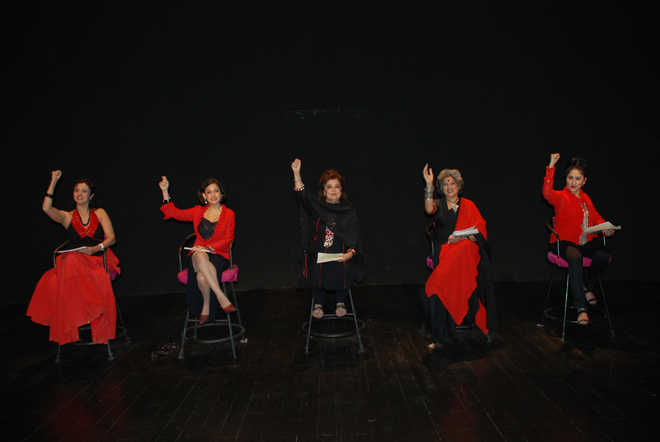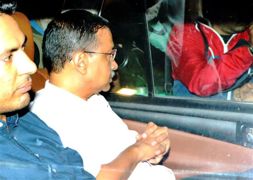
The curtains don’t fall: Even after more than 1000 shows, Vagina Monologues, which was first performed in 2003, runs to a packed house
Surekha Kadapa-Bose
At a time when cinema has a turnover of millions, television shows have been running for years, actors and producers are raking in the moolah, including new entrants on social media, yet in all this theatre, the world’s first form of entertainment, has been chugging along. It neither has the money, the visibility nor the fame. But actors of every genre swear by it.
“That is because there is an audience which realises the thrill of live theatre. Any live event becomes more humane due to the ‘human error factor’ and that adds to the thrill,” declares Nitish Bhardwaj, once again performing the role of Lord Krishna in the currently running play Chakravyuha, which has completed more than 65 shows. His first role as Lord Krishna in B. R. Chopra-produced TV serial Mahabharata (1988) immortalised him.
“There is human touch and a live audience! Even the long-running plays have something new happening in every show. This is what keeps the adrenalin pumping”, says Jayati Bhatia, who has acted in television series like Sasural Simar Ka, Kahani Ghar Ghar Ki, Jassi Jaise Koi Nahin and theatre shows like Vagina Monologues, Blame it on Yashraj, Mahatma Vs Gandhi for more than two decades now.
A well-written and well-directed play often gets a full house and has a tremendous repeat value. The longest-running play in the world, Mousetrap, is written by English crime novelist and playwriter Dame Agatha Christie. It opened in London’s West End in 1952 and has completed 26,703 shows at its last count!
In India, too, several plays in many regional languages, have completed more than 2,000 to 3,000 shows. Many have been staged for decades with a change of actors and directors. To name a few: in Marathi, we have Ghasiram Kotwal, written by Vijay Tendulkar and directed by Dr Jabbar Patel (1973), Nat Samrat written by V. V. Shirwadkar and acted brilliantly by Dr Shriram Lagoo (1970), Katyar Kaljat Ghusali made famous by the singing and acting of Vasantrao Deshpande (1967). In Kannada, we have Hayavadana by Girish Karnad (1971), Jokumar Swamy (1972) directed by B.V.Karanth, Mukhya Mantri (play adapted by Ranjit Kapoor from a 1976 novel by Panchari Sen, translated by TS Lohitshwah (1978). In English, we have Dance Like A Man directed by Lillete Dubey (more than 550 shows), Hamlet the Crown Prince directed by Rajat Kapoor (more than 200 shows in Mumbai alone), Love Letters was adapted in India (1993) from Pulitzer prize-winning American play by A. R. Gurney. The latest sensation is English play Vagina Monologues, which was first performed in 2003, and even after more than 1000 shows, it runs to a packed house.
“A play has repeat value if the subject is forever relevant”, observes Mahabanoo Mody-Kotwal, the woman behind Indian adaption of the iconic Vagina Monolgues (1996) play by Eve Ensler. The popularity of the play and a demand for it to be staged in places where English isn’t the spoken or common language, made them translate it into Hindi as Kissa Yoni Ka.
There are many Hindi plays, especially from IPTA (Indian People’s Theatre Association) like Bakri (directed by M. S. Sathyu), Ek Mamuli Aadmi (directed by Raman Kumar), Ek Aur Dronacharya (S. Dangyach), Sir Sir Sarla, Ek Kadam Aage (Makarand Deshpande), which have been staged to full house.
Actor Om Katare, founder of the Yatri Theatre group (1979) which has staged more than 5,500 shows of his plays, says, “No one can touch the charm of theatre. If only there were more theatre spaces, our plays could have easily given tough competition to other entertainment bodies.”
Veteran theatre, TV and film actor Aanjjan Srivastav says, lack of space and media coverage is the bane of theatre. “If we get more media coverage, popularity of theatre will increase. It will bring in sponsors, moolah and attract more talent”, he adds.



























